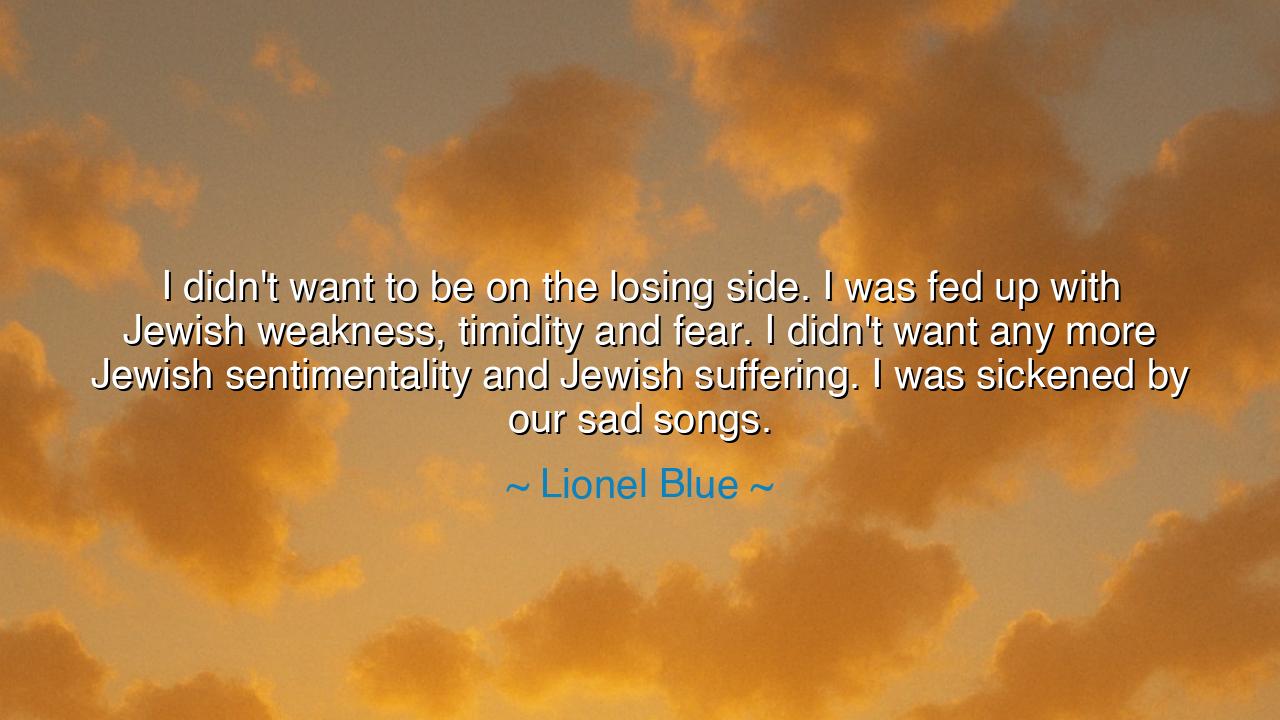
I didn't want to be on the losing side. I was fed up with Jewish
I didn't want to be on the losing side. I was fed up with Jewish weakness, timidity and fear. I didn't want any more Jewish sentimentality and Jewish suffering. I was sickened by our sad songs.






There are words that tremble with centuries of inherited pain. When Lionel Blue said, “I didn't want to be on the losing side. I was fed up with Jewish weakness, timidity and fear. I didn't want any more Jewish sentimentality and Jewish suffering. I was sickened by our sad songs,” he was not rejecting his people—he was crying out for their rebirth. His words were born not from disdain, but from exhaustion; not from betrayal, but from a longing for strength. In them, we hear the voice of one who has looked too long upon the ruins of his own history and decided that survival alone is not enough—there must be dignity, courage, and renewal.
To understand the depth of this quote, one must remember that Lionel Blue was a British rabbi who lived in the shadow of the Holocaust, a child of a people whose songs had too often been laments. For generations, the Jewish story was told in tones of mourning—songs of exile, of pogroms, of persecution. To be Jewish was to endure. But Blue’s declaration tears through that cycle like a sword through fog. He refuses to let tragedy become identity. He seeks a new vision—one where his people no longer define themselves by what has been done to them, but by what they choose to become.
The “sad songs” he speaks of are not merely melodies; they are symbols of an entire posture of spirit—the tendency of a wounded people to cling to sorrow as proof of survival. Yet Blue, in his fierce clarity, saw that grief can become a prison if it is not transformed. He wanted not to forget the past, but to rise above it, to see in the ashes not perpetual victimhood, but the spark of a new strength. In this sense, his words echo the wisdom of the prophets, who always called their people not to wallow in pain, but to stand up and rebuild Jerusalem.
Consider the story of Golda Meir, the woman who rose from a life of poverty and exile to become the Prime Minister of Israel. She, too, knew the weight of Jewish suffering, but she refused to bow to it. When her nation was threatened, she said, “We have always said that in our war with the Arabs we had a secret weapon — no alternative.” That is the spirit Lionel Blue longed for—a people who, forged in suffering, finally learned not just to survive, but to fight for life. It is the difference between carrying the memory of sorrow and being enslaved by it.
Blue’s words are also a mirror for every soul, of every faith, that has grown weary of its own helplessness. His defiance is not only Jewish—it is human. Every community that has endured oppression must one day face this same crossroads: whether to continue singing its sad songs, or to rise and write new ones. To cling to the comfort of suffering is to remain a prisoner of the past; to transform pain into strength is to become a creator of the future.
Yet, there is danger in misunderstanding his tone. When he says he was “fed up with weakness,” he does not mean cruelty or hardness should replace compassion. Rather, he calls for a strong tenderness, a courage that does not yield to despair. The true opposite of timidity is not aggression—it is the quiet, unwavering dignity of those who know their worth. Blue was not calling for vengeance; he was calling for resurrection. His cry was the cry of a spirit that refuses to kneel any longer beneath history’s weight.
Thus, the lesson is both ancient and eternal: suffering may shape us, but it must never define us. The songs of sorrow have their place, but they are meant to be followed by songs of triumph. Every person, every people, must one day grow tired of their own lamentations and begin to sing anew. When Lionel Blue said he was sickened by the sad songs, he was really saying that healing had begun—that he was ready to be free.
And so we must each ask ourselves: what sad songs do we still sing about our own lives, our nations, our identities? At what point do we stop mourning what was lost and start building what can be born? The ancient sages would tell us this—strength does not deny pain; it transforms it. Let us, then, be like Lionel Blue—not ashamed of our past, but unwilling to be trapped in its sorrow. Let our new songs be fierce, radiant, and alive—songs of courage that echo across generations, reminding all who hear them that the human spirit, once awakened, cannot remain on the losing side.






AAdministratorAdministrator
Welcome, honored guests. Please leave a comment, we will respond soon